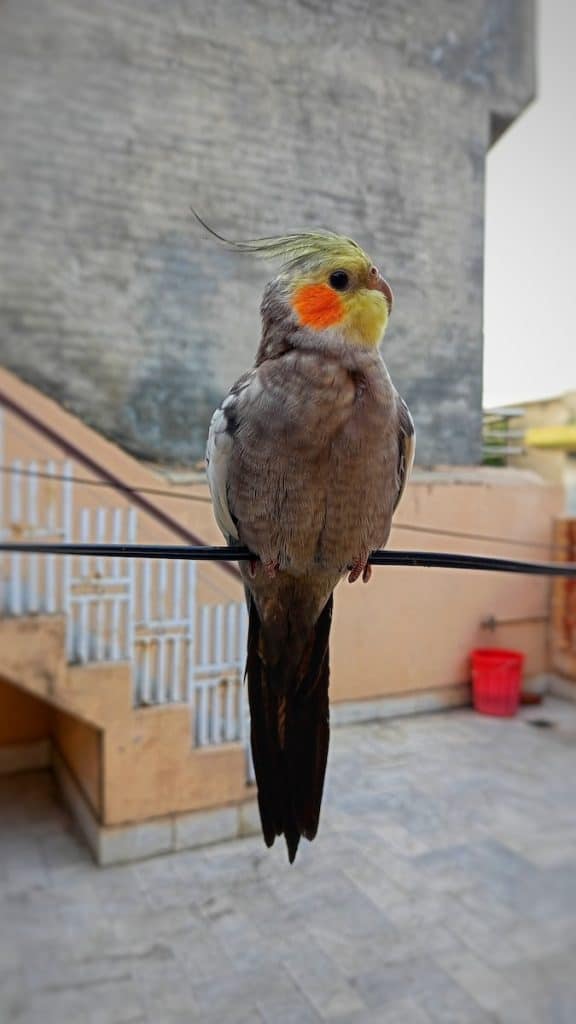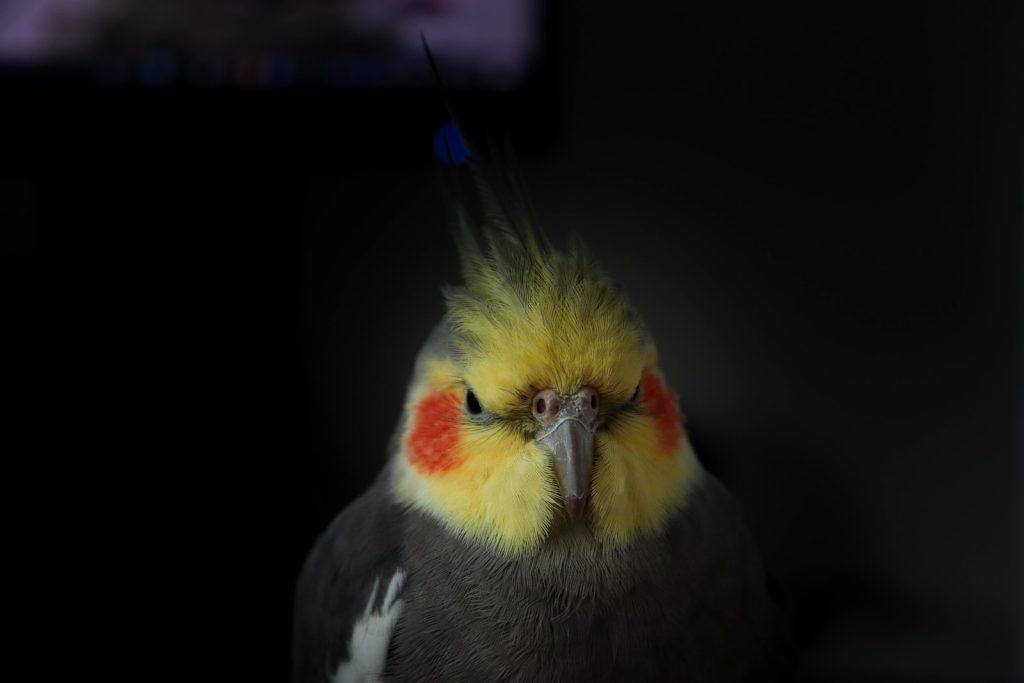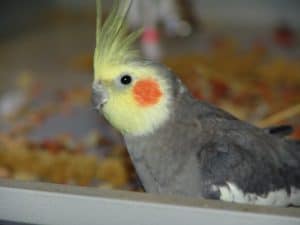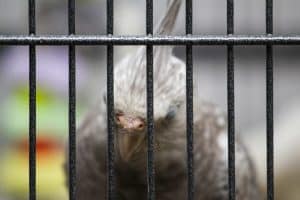Not only do we humans need to watch our weight, but so do our birds. Do you know if your bird is the proper weight or you have an overweight cockatiel? If you answered yes, you should think again. We’ll show you what it means to have an overweight cockatiel, how to tell whether or not your bird is overweight, and then go over some of the techniques for bringing your bird back to a healthy weight gain. We’ll also give you advice on telling when your bird isn’t getting enough food or nutrients, which might lead to underweight circumstances.
How Do You Keep a Bird Healthy?
To keep your bird healthy, you must give it a diet that consists of raw plant-based foods. This will not only make sure that your bird is getting all the nutrition it needs, but also provide them with different vitamins and minerals from plants they would otherwise not have access to if their diet consisted only of commercial seeds or pellets.
The avian body is built for flight. Birds have hollow bones, lightweight skeletons, and small stomachs when compared to their size, making flying much easier. The flight would be difficult if not impossible without such light weight constructions. Their bones are thin structures of hard tissue that contain air sacs within their walls.
Birds carrying extra weight have more difficulty flying, climbing and exercising than those at a normal weight. The excess baggage is also hard on their joints and some of their organs. Those who are underweight may become weak and have reduced physical stamina.
It might be difficult to determine the condition of your bird if it becomes obese or undernourished without taking its measurements or performing a body condition score (BCS). This table may assist you in determining whether your bird is an appropriate weight, underweight, or overweight cockatiel.

How Do I Weigh My Bird?
To get an accurate weight for your parrot, you need to use a scale that weighs in grams. Birds are very lightweight, so weighing them in grams offers much more accuracy than other units of measurement. A standard kitchen or postal scale will work just fine; these usually cost around $25 on Amazon. Digital scales tend to be the most accurate option. To find the ideal weight range for your specific bird species, do a quick Google search – for instance, green-cheeked conures generally fall between 60-75 grams while sun conures typically weigh 95-120 grams.
By monitoring your parrot’s weight weekly, you will be able to detect early changes in their body condition. This is important because even a 10% change for an adult bird can signal that something is wrong.
How Else Can You Tell if Your Bird Is a Healthy Weight?
It’s difficult to tell whether your bird is the correct weight just by looking at it. Instead, you’ll need to feel its breast bone. Your bird’s breast bone should be prominent yet not sharp. If you can’t detect anything,
You can teach your bird to allow you to handle it and even lie down on its back in your palm or on your forearm. It might take two people to handle a large, nervous bird like this though. If you’re unsure of how to go about it, check out this blog post on how to towel a bird so that it can’t flap its wings and try to get away.
If you don’t know how to tell if your parrot is the proper bird’s weight, here’s a quick guide. Place your palm over the bird’s breastbone so that its back is facing up and its chest towards you. If you can press down and feel a noticeable but not sharp keel bone, then it is at a healthy weight. However, if you cannot feel any bones or the breastbone feels sharp, then your property may be obese or emaciated respectively.
To fly properly, birds need healthy breast muscle. As such, it’s essential that your parrot has the right amount of muscle and not too much fat on its body–particularly around the breast area. Without feeling restricted in any way, it should be able to move easily during flight. You achieve this by feeding it a proper diet and ensuring that it exercises regularly; overeating fatty foods is likely one of the primary causes of obesity in pet birds or fatty liver disease.
How Do I Know If I Have An Overweight Cockatiel?
To determine if your bird is overweight, press lightly on the breast bone; if you can feel it, that’s an indication of a healthy weight. If you cannot even feel the breastbone, your bird would be considered obese. Sometimes, you might see pockets of fat moving around when assessing your pet bird’s weight this way.
You may maintain your bird’s health in the same way you would with people. You can aid your bird’s health by changing its diet and giving it opportunities to exercise. If your bird is just a little overweight, you can probably support it at home. Working with an avian veterinarian if your birds’ weight problem is moderate to severe is advised because birds are fragile creatures with their own set of body systems that must not be tampered with while trying to get them to their ideal weight.
- NOTE : After a customer contact us about the potential safe problem of the metal clip and small bell, we've changed clip to cotton rope on the top and raplace bell with bigger size. Safer, Easier to hang in multiple places, good decoration for parrot's cage.
- MATERIAL : Parrot chewing toys made of porous mineral stone, rich of calcium for pet's health while grinding bird's beak.
- ADVANTAGES : Colorful beads between lava stones and the bell on the bottom attract parrot's attention, reduce loneliness, good for parrot's psychological wellness.
- DESIGN : Star shaped design of the stone make it easy for parrots to trim and clean their beak.
- WIDE FOR : Not only as bird supplies(African Greys Amazon Conure Cockatoo Eclectus Budgies Parakeet Cockatiel), but also for rodents to grind teeth(Hamster Chinchilla Rabbit Mouse Squirrel Gerbil). Best for small animals under one year of age.
Overweight Cockatiel: Why Is My Bird Are Getting Fat?
Because birds are largely vegetarian, they require a diet that includes a lot of uncooked plant-based meals, such as veggies, low-sugar fruits, herbs, flowers, and more. Vegetables are high in vitamins and minerals and fiber.
A diet consisting of only bird seed is not as healthy as it may seems. In fact, most commercial seeds lack the nutrition that your bird needs and are filled with unhealthy oils instead. These oils are high in calories (130-180 calories/100g) but low in nutritional value. This means that when your bird eats these foods in excess, he’s consuming more calories than necessary from an unbalanced diet—which puts him at risk for obesity and other diseases
Just like humans, birds need a balanced diet to stay healthy. If they eat too much seed, they can become obese over time. Birds also have very high metabolisms and need lots of exercise – without it, they can get fat just like humans.
Overweight Cockatiel: How Can I Help My Bird Lose Weight?
When your bird’s overall health is not good, we recommend switching him to a fresh, uncooked plant-based diet with a high quality pellet like Harrison’s, Roudybush, or TOPS.
The secret to helping your overweight cockatiel is to cut back on their calories without sacrificing nutrients. This means cutting out high-fat foods ( like nuts) . When transitioning your bird from seeds and pellets to fruits and veggies, introduce new flavors gradually so they can get used to them. If you want them to slim down faster, try adding more leafy greens such as lettuce.
You should also provide your bird with a lot of exercise opportunities. Bats are naturally energetic animals that require room to flap their wings in order to stay healthy. Larger birds, such as cockatoos or macaws, are particularly sensitive about this.
If your bird has evolved entirely for flight, you’ll need to make sure it gets plenty of exercise. This may be done by playing with them as much as possible outside the cage or providing them with lots of interactive toys inside. If feasible, leave the cage door open during the day and put a foraging tree nearby where you can build foraging stations for your bird to explore.
You’ve undoubtedly heard of harness training. This is a fantastic method for you and your bird to use! Harness training allows your pet more opportunity to exercise, have fun, and discover new locations while also assisting them in losing weight through calorie burn.
Overweight Cockatiel: How Do I Fix My Birds Diet?
If you want your parrot to shed some pounds, upping his intake of raw fruits, vegetables, sprouts, and the like is the way to go. Not only will he get more bulk this way—essential for keeping him satisfied— but he’ll also consume vital nutrients that will help him stay healthy overall.
If your parrot won’t eat vegetables, try converting them into sweets by cutting them up or combining them with their normal food. If your parrot is overweight, start slowly by adding only one new vegetable each day for two weeks. Birds enjoy eating what you’re eating, so if you want your bird to be healthy, offer it a varied diet that includes plenty of plant-based foods.
If he sees you eating these foods, he will be more inclined to try them! Be patient with your pet parrot while he learns; don’t give up!
Overweight Cockatiel: Bottom Line
If you have an overweight cockatiel, there are things you can do to help him slim down. First, switch him to a fresh, plant-based diet with high quality pellets. Next, provide him with plenty of exercise opportunities. Finally, be patient as he learns to enjoy new foods. With your help, your cockatiel will be back to a healthy weight in no time!
For those eager to enhance their care routines for their cockatiels, make sure to delve into these insightful articles. Learn whether a cockatiel can eat too much millet and understand the dietary balance needed for your bird. Ever wondered why your cockatiel flies onto your head? Find out the reasons behind this behavior and how to manage it.




